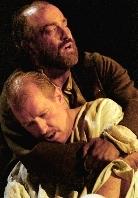King Lear review from 2005
Tom Piper's semi-industrial set of brickwork and iron girders, provides the austere background for King Lear, a disturbing play where the machinations and insanity of the characters is reflected in the ragings of nature.
King Lear decides to split his kingdom between his three daughters: Gonerill, Regan and Cordelia. However, there's a price to pay - each has to tell their father how much they love him. While Gonerill and Regan are quick to rise to the occasion and say what their father wants to hear, Cordelia (somewhat undiplomatically) refuses to say anything more than what she regards as her duty. Lear flies into a rage, disowns Cordelia and promptly banishes the Earl of Kent who has the nerve to stand-up for her.
Of course, Lear has set in motion a train of events that not only leads to his own madness and death, but some rather nasty consequences for all the other principal characters. The ageing nice-guy, Gloucester, has his eyes ripped out, and at the end of the play the stage is littered with numerous bodies including all Lear's daughters.
Widely regarded as a masterpiece (Shakespeare was apparently writing at the height of his powers), this play isn't an easy one for either the players or the audience to tackle. First, at almost four hours long (including a 20 minute interval) it's an endurance test for all concerned - it was singularly failed by one member of the audience who was snoring behind us in the first act!
But the play is also immensely dark and bleak, and few (if any) of the characters have redeeming qualities that the audience can 'warm' to. Even Kent (Louis Hilyer), banished by the King but loyal enough to return in disguise to keep an eye on his monarch, seems somewhat frantic in his actions. And Gloucester is easily duped by his bastard son, Edmund, into believing his legitimate son, Edgar, is plotting against him. However, this may just be what Shakespeare had in mind - a ship of fools, sailing towards the rocks of insanity. Nevertheless, it's an unsettling play if only because it leaves no sense of hope at the end.
Accompanied by Jonathan Goldstein's sombre and atmospheric music, and storm effects that would wake the dead, Bill Alexander's production is studied and considered, as one would expect from the RSC. But it left me wanting more from the playing and characterisation.
For example, Matthew Rhys raised quite a few laughs with his conniving as the bastard, Edmund, but didn't quite reach the epitome of evil I expected. Lear's Fool (Leo Wringer) seemed more like a carping 'told-you-so' know-all than someone who was bound to Lear by love and real affection. And the power-hungry daughters - Regan and Gonerill - weren't sufficiently devious or nasty enough for my liking.
Corin Redgrave rages through the play in the demanding and exhausting role of Lear. But he appears too youthful, and left me unconvinced about Lear's motives for abdicating his power in the first place. And his initial appearance - feigning infirmity - gave the impression of someone already a little 'unhinged', which to some extent, took the edge off his later decline into total madness.
Having said that, this is a highly professional production worth seeing if only to test your own stamina and ability to cope with the melancholic subject matter. Just don't expect to leave with a 'spring in your step'.
Production photo: © RSC John Haynes
What other critics had to say.....
NICHOLAS DE JONGH for THE EVENING STANDARD says, "Bill Alexander's torpid...production makes it seem if the tragedy is being staged in a rehearsal room roughed up by vandals, not in a country tipping towards civil war." MICHAEL BILLINGTON for THE GUARDIAN says, "While I admire Redgrave's performance, Bill Alexander's production strikes me as no more than a serviceable framework." CHARLES SPENCER for THE DAILY TELEGRAPH says, "Bill Alexander's production, with Corin Redgrave in the title role, still strikes me as a grievous disappointment." BENEDICT NIGHTINGALE for THE TIMES says, "...cast is more uneven than we expect of the RSC." SARAH HEMMING for THE FINANCIAL TIMES says, "It does not quite reach the peak of this Everest of a play."
External links to full reviews from popular press
The Guardian
Daily Telegraph
The Times
Financial Times
Originally published on
